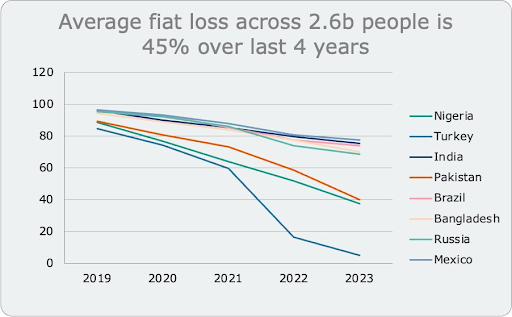Over the past four years, over 2.6 billion people have experienced a 45% loss of purchasing power. In Nigeria, currency depreciation has eroded the value of the Naira, impacting millions of Nigerians.
Over 2.6B people have lost 45% of their purchasing power (on average) over the past 4 years.
Imagine working 9-5 for years only to have your savings evaporate into thin air.
Bitcoin fixes this. pic.twitter.com/ylooeoPXS6
— Lark Davis (@TheCryptoLark) October 20, 2024
Many Nigerians are now turning to Bitcoin as a financial investment to preserve their wealth and savings from inflation and the Naira’s decline.
Fiat Currency Depreciation and Inflation Surge
Between 2019 and 2023, Nigeria’s currency depreciated significantly, with the Naira losing nearly all its purchasing power. In 2022, the Naira held its value at 2019 levels, but by 2023, it had plummeted.
Read also: Stablecoins Propel Nigeria to 2nd Place in Crypto Adoption

This sharp decline is far more severe than in countries like Turkey, India, and Brazil, which have also struggled with inflation. Nigeria’s economic crisis is driven by inflation, with fuel prices increasing to 1,030 Naira per liter.
Economic Hardships Drive Capital Flight from Nigeria
Nigeria’s economic challenges extend beyond currency depreciation. The country faces excessive taxation, high borrowing costs, and increasing forex volatility, all of which contribute to the high cost of doing business.
Artisans and small business owners face tax rates as high as 49%, hindering their ability to operate. These factors have prompted investor exits, with portfolio investors leaving after initially capitalizing on temporary gains in Nigeria’s investment market.
In 2015, Nigeria’s debt situation was under control due to debt reduction measures implemented by previous administrations. However, the country’s debt has grown under the All Progressives Congress (APC) government.
Read also: Nigeria Set to Ban Peer-to-Peer Crypto Trading Amid Naira Depreciation
There is fire on the mountain, but Nigerians are debating soups. The NNPC have increased petrol price to 1,030 Naira a litre. Capital Importation into Nigeria is at its lowest.
Huge amount of capital are moving out of Nigeria in droves. Asiwaju has been unable to attract FDIs,… pic.twitter.com/uiwsuTPxrW
— NEFERTITI (@firstladyship) October 9, 2024
Between 2015 and 2023, the government increased borrowing, with former President Buhari adding N23 trillion to the national debt over eight years.
As the Naira continues to decline and inflation weakens purchasing power, Bitcoin has emerged as a lifeline for many Nigerians seeking to protect their wealth. Currently, Bitcoin’s price stands at $68,681.96, with a market capitalization of $1.36 trillion.
Disclaimer: The information presented in this article is for informational and educational purposes only. The article does not constitute financial advice or advice of any kind. Coin Edition is not responsible for any losses incurred as a result of the utilization of content, products, or services mentioned. Readers are advised to exercise caution before taking any action related to the company.
Over the past four years, over 2.6 billion people have experienced a 45% loss of purchasing power. In Nigeria, currency depreciation has eroded the value of the Naira, impacting millions of Nigerians.
Over 2.6B people have lost 45% of their purchasing power (on average) over the past 4 years.
Imagine working 9-5 for years only to have your savings evaporate into thin air.
Bitcoin fixes this. pic.twitter.com/ylooeoPXS6
— Lark Davis (@TheCryptoLark) October 20, 2024
Many Nigerians are now turning to Bitcoin as a financial investment to preserve their wealth and savings from inflation and the Naira’s decline.
Fiat Currency Depreciation and Inflation Surge
Between 2019 and 2023, Nigeria’s currency depreciated significantly, with the Naira losing nearly all its purchasing power. In 2022, the Naira held its value at 2019 levels, but by 2023, it had plummeted.
Read also: Stablecoins Propel Nigeria to 2nd Place in Crypto Adoption

This sharp decline is far more severe than in countries like Turkey, India, and Brazil, which have also struggled with inflation. Nigeria’s economic crisis is driven by inflation, with fuel prices increasing to 1,030 Naira per liter.
Economic Hardships Drive Capital Flight from Nigeria
Nigeria’s economic challenges extend beyond currency depreciation. The country faces excessive taxation, high borrowing costs, and increasing forex volatility, all of which contribute to the high cost of doing business.
Artisans and small business owners face tax rates as high as 49%, hindering their ability to operate. These factors have prompted investor exits, with portfolio investors leaving after initially capitalizing on temporary gains in Nigeria’s investment market.
In 2015, Nigeria’s debt situation was under control due to debt reduction measures implemented by previous administrations. However, the country’s debt has grown under the All Progressives Congress (APC) government.
Read also: Nigeria Set to Ban Peer-to-Peer Crypto Trading Amid Naira Depreciation
There is fire on the mountain, but Nigerians are debating soups. The NNPC have increased petrol price to 1,030 Naira a litre. Capital Importation into Nigeria is at its lowest.
Huge amount of capital are moving out of Nigeria in droves. Asiwaju has been unable to attract FDIs,… pic.twitter.com/uiwsuTPxrW
— NEFERTITI (@firstladyship) October 9, 2024
Between 2015 and 2023, the government increased borrowing, with former President Buhari adding N23 trillion to the national debt over eight years.
As the Naira continues to decline and inflation weakens purchasing power, Bitcoin has emerged as a lifeline for many Nigerians seeking to protect their wealth. Currently, Bitcoin’s price stands at $68,681.96, with a market capitalization of $1.36 trillion.
Disclaimer: The information presented in this article is for informational and educational purposes only. The article does not constitute financial advice or advice of any kind. Coin Edition is not responsible for any losses incurred as a result of the utilization of content, products, or services mentioned. Readers are advised to exercise caution before taking any action related to the company.





